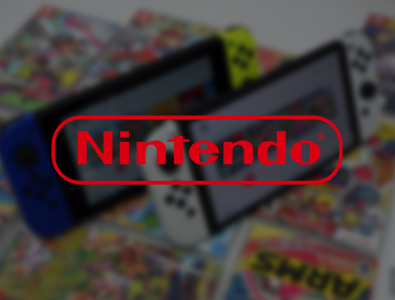On this page
HASBRO Stock on a Substantial Decline—Could the End be Near?
INTRODUCTION & DISCLAIMER
This article is not meant to be taken as stock advice in any way whatsoever and is being written for entertainment, educational and informational purposes only.
The writer of this article, Brandon James, has no positions in Hasbro, or any other company that may be mentioned in this article, or any subsidiary of Hasbro (or any other company mentioned) and has no plans to initiate any such position within the next thirty days.
With that out of the way, some of you may recall my Wizard of Odds page wherein we looked at the world of collectibles, in general, to discuss whether or not they are an investment, a confidence game or a gamble.
As expressed in that page, I consider any form of financial risk in anticipation of positive returns, but with the possibility that there will not be profits, as a form of gambling. With that, pursuant to my point of view, investing/trading in stocks is also a gamble. Granted, taking some positions (such as investing in treasury bonds) is something closer to a, “Sure thing,” than other forms of investment, but fundamentally, anything with non-zero risk, by definition, does not have a fixed guaranteed return and could be called a gamble.
A substantial percentage of that article related back to Magic the Gathering’s 30th Anniversary product and detailed that release. Additionally, it was discussed whether or not Hasbro has been oversaturating the market, in general.
At the time of that publishing, Hasbro was trading at over $60 per share, but just three months later, as of March 14th, 2023 at 14:15 EST, we see that Hasbro’s share price is down to $47.11 per share.
Looking at Historic prices, we can find only one brief period of time, in the last five years, during which Hasbro closed a day at a lower price than it is presently trading today; those occurrences were all in the same week of March, 2020, during the Covid-19 pandemic during which time the entire broader market (except certain healthcare stocks) took an absolute nosedive.
Even prior to the announcement of any Government stimulus packages, Hasbro was also one of the first stocks to nearly fully recover to its pre-Covid valuations.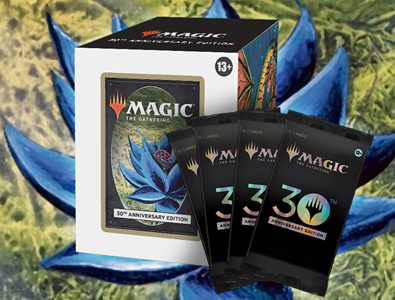
WHAT HAS BEEN HAPPENING?
In recent months, Bank of America has stated, and reiterated, that they consider Hasbro to be a strong sell…which even predates strong recession indicators. Part of BoA’s analysis was predicated upon the reaction of the public, notably of loyal Magic: The Gathering players, to Magic’s 30th Anniversary box set.
Interestingly, whilst the sale of 30th Anniversary came to an end, Magic’s Twitter feed did not actually state that the product had sold out. In fact, some outlets described the end of the sale as, “Mysterious,” as Hasbro pulled the plug after only one hour of the product being available on their website.
One would almost certainly assume that Hasbro would have happily announced that the product had sold out of any quantities that were intended to be available directly to the public, but they did not announce any such. Instead, Hasbro (through Magic: The Gathering) simply announced that the sale had ended.
For those reasons, my assumption is that Magic 30th Anniversary did not sell out. Of course, my assumption is based on a little bit more circumstantial evidence than just that.
If we look at Hasbro’s Balance Sheet, for example, we can find that there was a significant increase to the, “Inventory,” line item as we compare 2022 to 2021. Of course, inventory increased by an even greater extent when we compare 2021 to 2020, but production getting back online after the Covid-19 pandemic explains some of that. It’s for the opposite of that reason that inventory on hand decreased from 2019 to 2020.
If we consider the opinion that Hasbro has been overprinting cards and flooding the market with new products that its consumers have largely not been able to keep up with (in terms of purchasing them), then that certainly accounts for some of the increased inventories. However, one must assume that some of those inventories are coming from printed Magic 30th Anniversary boxes that did not sell.
Each of those would have been accounted for as $999 in assets, which was the intended selling price. Of course, Hasbro had already determined that they were giving away some of these boxes to select local game stores, so it is unknown whether or not those sets were included in inventories, and if they were, whether they were included as an asset with an assumed value of $999/apiece.
As of the time of this writing, TCGPlayer has a secondary market price of $1,129.36 for Magic 30th Anniversary, though it spent much of its time well over $1,500 before absolutely falling off a cliff. The presumption that I have is that many of these LGS simply decided to take their free boxes and flip them for cash on the secondary market.
There’s a certain logic in that, of course. 30th Anniversary, it is widely known, was being sold by Hasbro for $999.99, before shipping and tax. If 30th Anniversary is going to ever become a hot collector item well over the price that Hasbro wanted for it, upon its release, that hasn’t really had much time to manifest yet. Of course, that’s not to say it will ever exceed that $1,500-$1,600 range again whatsoever.
Recent transactions have largely been in the $1100-$1200 range, with a few units being sold on the secondary market for under $1,100. On one occasion, it would appear that the box was sold for the $999.99 that Hasbro had wanted for it when they were selling directly to consumer.
The market price has actually held up surprisingly well given the fact that it should be no secret that some of these units being moved on the secondary market were units that the seller received for free in the first place.
Either way, there has been some speculation that roughly as many boxes out there in the world as not were provided by Hasbro at no charge.
It’s little secret that the Magic: The Gathering property comprises so much of Hasbro’s revenues that the company is destined to perform as well, or as badly, as its most important brand. With that, one would think that revenues for Magic exceeding one billion for the first time would be a positive sign, but some analysts fear that 2023 is going to be a tough year and some of that revenue has come at the expense of flooding the market and alienating consumers.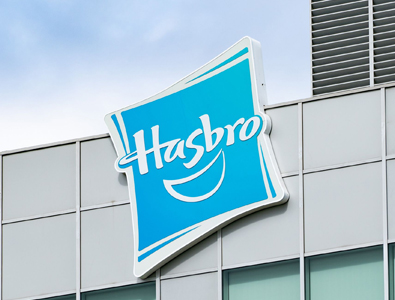
WHAT ARE THE PROBLEMS COMING UP?
The biggest upcoming problem is that 2023, and perhaps even 2024, will likely not be good years for Hasbro. Hasbro, in general, and Magic: The Gathering specifically, deal in a product very much based on discretionary income.
In addition to prices going up dramatically on just about anything people actually need in the last few years, via inflation, economists are widely projecting an economic downturn (seriousness varies) in the near future. That could result in prices retracing back to something closer to pre-pandemic levels, but it’s highly unlikely that they will fully retrace and, for many, the damage has already been done.
According to LendingTree, Americans have now exceeded our pre-pandemic highs for average credit card debt. More than that, interest rates are now higher (on variable rate products) than they were at the time as a result of continuing increases by the Fed.
The biggest problem with that is it creates a vicious cycle that does necessarily require that much in additional credit card spending, though increases to spending are likely also taking place.
The reason why is because, if interest rates increase, and general consumer goods prices increase (as well as other things such as rent and healthcare costs), then we can presume that people have fewer extra dollars that they can devote to paying these credit card balances down. In fact, since many of us in society sort of like it right there on the edge, it’s possible that many Americans are not even able to afford their basic needs without making more purchases on credit cards.
The result is that, on the whole, people are making lower payments on their credit cards, which have a higher interest rate, then month-over-month, some people are making new purchases on those same credit cards that exceed the amounts of the payments that they have made.
In short, the sector that is discretionary consumer spending is likely poised to have a difficult year or two as we plow ahead. Of course, certain categories in that same sector (such as collectibles) indirectly benefited from the Covid-19 pandemic as well as the stimulus funds that went directly to the public which, in many cases, simply became discretionary spending money.
Additionally, collectibles (and some other market segments) didn’t have as many different product categories to compete with for that discretionary spend. For example, many states closed restaurants to indoor dining for periods of several months with the same being true for athletic venues, concert venues and casinos.
Essentially, you had a bunch of people (some of whom would have probably spent money on Magic if they had it to spend) who got an injection of discretionary funds, but had a limited number of ways in which to spend those funds. In short, Covid-19 was amazing for collectibles, or, more specifically, the direct stimulus monies that went to folks as a result of Covid-19.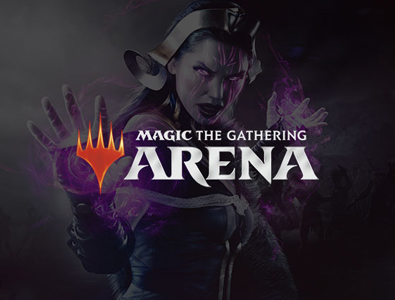
Unfortunately, for Hasbro, that ship has sailed. Hasbro did go with the strategy of making a huge push to monetize all of these individuals jumping back into the game as much as possible, but it seems like such a hard push might only pay off in the extreme short-term. Long-term, I would expect the Magic: The Gathering brand to mostly get back to doing what it was doing with a consistent release schedule and predictable sales.
It also bears mentioning that much of this might have stemmed from Magic the Gathering: Arena being a gateway for people getting back into the game during the Covid-19 pandemic. My theory is that some people (with fewer places to go and less to do with free time) discovered that product, then when those discretionary monies came in, decided to get back into the paper product. I suppose being asked to pay basically a thousand bucks for proxies barely two years later isn’t exactly the warmest welcome back.
When we look at the twelve month change in share prices and compare Hasbro to other companies within the market segment, we find that Hasbro has dropped 46.61% in the last twelve calendar months as well as almost 23% YTD.
Nintendo, for comparison, is down almost 12% in the last twelve calendar months as well as almost 8.5% YTD, respectively. Take Two Interactive shares some of the digital space with Hasbro and has dropped just over 20% in the last twelve calendar months, but remains up for the year, thus far. One recent event involving Take Two is the fact that they bought Zynga out.
Nintendo, some may not know, is not strictly a video games company. In fact, they do all kinds of stuff, but the biggest comparable to Hasbro is with the Pokemon franchise that has video games, digital assets and also a trading card game. Of course, even Pokemon is diversified as Nintendo is one of three owners of that property.
Bandai Namco is down almost 8% in the last twelve months, but is down less than 1% for YTD (2023) as of the time of this writing. Bandai Namco is known as one of the largest video game publishing companies, but similarly to Nintendo, has other properties and franchises in the toy market.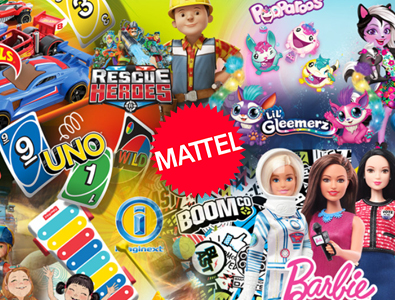
Mattel is possibly the closest competitor in the market space to Hasbro as they deal both in toys that people actively play as well as the fact that some Barbies have become a collectible. Mattel is down almost 28% in the last twelve calendar months and roughly 8.5% this year.
The question is: Why is Hasbro doing so poorly compared to these other companies?
The fundamental answers are twofold, but neither of them are particularly complicated:
1.) Magic: The Gathering is, by far, Hasbro’s most important property
-As Magic: The Gathering goes, so too goes Hasbro as the Magic brand, through Wizards of the Coast, is Hasbro’s sales leader. For Fiscal Year 2021, Wizards of the Coast (the subsidiary through which Magic is reported) accounted for just over 20% of ALL of Hasbro’s revenues as a company.
-Additionally, Wizards of the Coast accounted for more revenue than Hasbro’s entire Entertainment are (which lost money for the year, from an operating standpoint) and enjoyed greater operating products than Hasbro’s remaining portfolio of consumer products, combined.
-Relatively speaking, Magic: The Gathering is pretty cheap to manufacture relative to the price point that the cards, and other products, are sold for—which is what accounts for the fact that, of 1.286.6B in revenues for FY21, 547M dollars of those revenues (over 42.5%) are reflected in operating profits for the brand.
-This was even more pronounced in FY22 as Consumer Products operating profit fell from 401.4M to 217.3M whilst Wizards of the Coast fell slightly to 538.3M despite slightly stronger revenues. Of course, one has to assume that some of that decline came from the fact that Magic 30th Anniversary, I think we can assume, did not sell particularly well.
-While it is sure that Hasbro shares the same fate that Magic: The Gathering does, one thing that is unknown is how much of an impact the Magic 30th debacle, and possibility that they are oversaturating the market with product, will reflect in people dropping out of the game completely and disconnecting with the product, as a whole.
-For that reason, some of the price dive over the last twelve months might stem from this uncertainty, but for a company that has been around (Hasbro) for about a century, it’s probably not a strong indicator to be uncertain about the continued success of your #1 product. In terms of percentage of operating profit, Wizards of the Coast represented about 63.86% of Hasbro’s company-wide operating profits for 2021 and about 69.16% of same in 2022.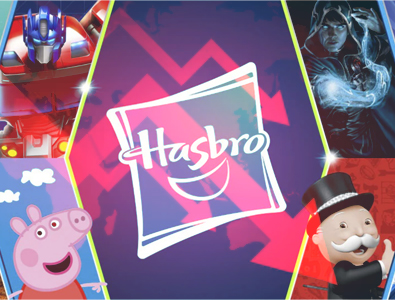
2.) Hasbro’s Other Properties May Continue to Decline
-While the entertainment arm of Hasbro actually made operating profits in 2022, those profits came as a result of decreased revenues as a result of less in expenses and the selling of a music property that hadn’t been doing particularly well.
-Hasbro’s other consumer properties include such brands as Scrabble and Monopoly (as well as many other board games). Additional non board game properties include toys, perhaps most notably the NERF toyline.
-The problem with these segments, particularly board games, is that consumer preferences have changed over the years with physical board games not being a popular as they once were. Hasbro recognized this and, in fact, has mobile app and computer versions of some of these games (such as RISK, Monopoly and Scrabble), but it should come as no surprise that these sorts of applications face a TON of competition in the online market and, even if they didn’t have any possible number of other apps/games to compete with, are a bit tougher to actually monetize than the physical versions of those games were at one time.
***
In terms of properties that are sold in the physical world, Magic: The Gathering is easily Hasbro’s largest, and most important, brand; it is also the brand most likely to stand the test of time as consumer preferences change. There remains a substantial market for the, “Paper product,” but one has to assume that players interested in the paper product will not be replaced at the rate that they will eventually disappear.
IS MAGIC: THE GATHERING POTENTIALLY IN TROUBLE?
The short answer is: I don’t think so.
I believe that the Magic: The Gathering brand is strong enough to survive just about anything, to one extent or another, and it would seem that Hasbro (the company) is in no serious immediate trouble of ceasing to operate as a going concern.
I also couldn’t imagine Hasbro selling off the Wizard of the Coasts segment of operations, though I guess such an event is technically possible. It would certainly be a quick way to generate cash if they ever found themselves in serious liquidity trouble, but that doesn’t seem like it will be a great concern anytime in the near future—especially if Wizards continues to generate operating profits even close to what they have been the last few years.
What I think might be more likely is that Hasbro gets bought, in its entirety, by some other property that shares substantial space in the market with it. The most likely candidate to buy out Hasbro, in my opinion, is probably Nintendo.
Not only could Nintendo afford to do it, but they could actually monetize Magic: The Gathering, and other Hasbro properties, in various other ways. For example, Nintendo could easily produce a video game that would be based on Magic: The Gathering, which I think would become a smash hit almost immediately. In addition to that, Hasbro’s other IP’s (that aren’t already video games) could be turned into video games, which Nintendo could then develop and add to their platforms without paying licensing fees as they’d already own the IP.
As mentioned, Nintendo is already one of three companies who have a stake in Pokemon; ironically, the Pokemon trading card game was actually first published by Wizards of the Coast!
As a result, Nintendo (and its Pokemon affiliates) already have substantial experience in the TCG/CCG market space and would be able to handle the addition of Wizards of the Coast pretty easily. Honestly, I think most people (from Wizards) would end up keeping their jobs in such a scenario.
With that, I don’t think Magic: The Gathering will cease to exist as a TCG/CCG at any time in the next several decades. Regardless of who owns Wizards of the Coast (or if it becomes its own company again) the IP is simply too valuable to ever fail in anything other than the extreme long-term.
Even if Hasbro went under without selling Wizards of the Coast, or selling itself entirely, there is absolutely no way that a competent company wouldn’t make the best bid for at least the Wizards of the Coast subsidiary, and, by extension, Magic: The Gathering. The game will be fine.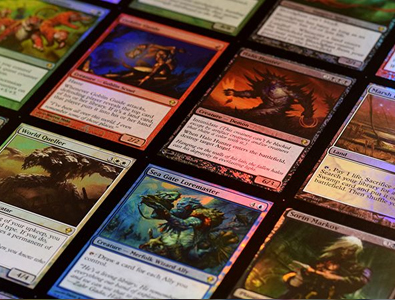
IS HASBRO IN TROUBLE?
Not really. I don’t think so.
While it’s true that their other brands seem to not be pulling in net operating profits the way they used to, Magic: The Gathering appears to be getting stronger as a brand. The Magic brand is certainly stronger than it was a few years ago.
Naturally, alienating some of the fans (arguably) wasn’t a great look and Hasbro, as with anyone in the discretionary space, is going to brace for a potential drop in revenues in the near future, but Magic: The Gathering remains an incredibly powerful brand and also remains highly profitable at a relatively low cost to the company.
Casual traders and investors have a habit of overreacting to recent events and news as opposed to looking at the bigger picture. Many people know about Bank of America double rating Hasbro as, “Underperforming,” and setting a price target of $42 per share, but what you don’t hear about is the fact that almost all other analysts thought Hasbro should be a Buy at prices higher than what it’s trading at right now. Other ratings are either Hold or Buy.
Of course, unfavorable press and investor/trader reactions to unfavorable press have a ripple effect sometimes, by which other weak hands see the price dropping and dump.
What’s baffling to me is, while it is true that Hasbro is extremely reliant on the Wizards of the Coast arm of their operations, that investors should think Hasbro is almost at its weakest point in the last five years, with the only weaker point being a few days in the middle of a pandemic?
I’m sorry, but I just don’t see it. I get that the market is a bit pessimistic, perhaps even a little angry, but you can’t tell me that Hasbro is in a worse position than it was in 2018. Certainly, the tightening discretionary spend that we can see on the horizon is going to hurt a bit, and Hasbro certainly isn’t going to keep everyone that got into (or back into) their most profitable products, but the worst case scenario that I can envision is that they get back to a steady release schedule, and steady revenue stream, from their multitude of loyal Magic players.
CONCLUSION
In conclusion, I believe Magic: The Gathering is going to be around for a very long time. At a minimum, let’s call it another thirty years, or so. The brand is simply too profitable, and too strong an IP, for nobody to own it (or it to essentially be spun off and own itself). Its long-term outlook, in my opinion, is very good. Even if it got back to business as usual (pre-pandemic), well, business as usual was pretty kick ass for that brand, so it would be fine.
I also don’t think Hasbro is in any significant danger, but certainly acting as an existential threat to the product that accounts for nearly 70% of its operating profit is not ideal. I think the worst case scenario is that they might learn to stay out of their own way and go back to a predictable and consistent release schedule that comes with predictable and consistent sales figures.
I think the best case scenario is for Hasbro to be bought out by a company with knowledge of the space, the money to do it and for whom Magic: The Gathering wouldn’t be such a significant percentage of their total revenues.



